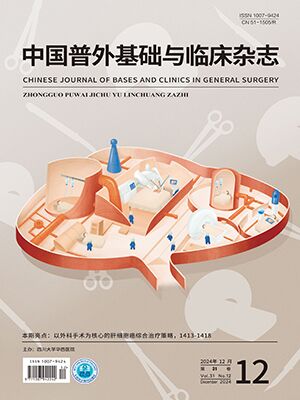| 1. |
Rom O, Reznick AZ. The stress reaction: A historical perspective. Adv Exp Med Biol, 2016, 905: 1-4.
|
| 2. |
Manalo RVM. Anastasis and the ER stress response: Solving the paradox of the unfolded protein response in cancer. Med Hypotheses, 2017, 109: 25-27.
|
| 3. |
Ősapay G, Ősapay K. Stress and fertility. Orv Hetil, 2015, 156(35): 1430-1434.
|
| 4. |
姜乾金. 医学心理学. 北京: 人民卫生出版社, 2010: 38-45..
|
| 5. |
Khoo B, Boshier PR, Freethy A, et al. Redefining the stress cortisol response to surgery. Clin Endocrinol (Oxf), 2017, 87(5): 451-458.
|
| 6. |
Nimmo SM, Foo ITH, Paterson HM. Enhanced recovery after surgery: Pain management. J Surg Oncol, 2017, 116(5): 583-591.
|
| 7. |
宋新明, 王吉甫, 赵继宗, 等. 手术方式对炎性细胞因子和应激激素的影响. 中国危重病急救医学, 1999, 11(7): 431-433.
|
| 8. |
Hardy KV, Mueser KT. Editorial: trauma, psychosis and posttraumatic stress disorder. Front Psychiatry, 2017, 8: 220.
|
| 9. |
Schwarz C, Fitschek F, Bar-Or D, et al. Inflammatory response and oxidative stress during liver resection. PLoS One, 2017, 12(10): e0185685.
|
| 10. |
石学银, 邹最. 加速康复外科的麻醉管理. 中华消化外科杂志, 2015, 14(1): 38-42.
|
| 11. |
Zhang A, Liu T, Zheng K, et al. Estimation of physiologic ability and surgical stress (E-PASS) scoring system could provide preoperative advice on whether to undergo laparoscopic surgery for colorectal cancer patients with a high physiological risk. Medicine (Baltimore), 2017, 96(33): e7772.
|
| 12. |
韩传宝, 钱燕宁, 周钦海. 术后镇痛对机体应激反应的调控. 国外医学(麻醉学与复苏分册), 2005, 26(2): 74-77.
|
| 13. |
Simsek A, Kirecci SL, Bayar G, et al. Evaluation of per-operative cough stress test during transobturator mid-urethral sling surgery. Arch Ital Urol Androl, 2017, 89(3): 222-225.
|
| 14. |
江志伟, 李宁. 结直肠手术应用加速康复外科中国专家共识(2015版). 中华胃肠外科杂志, 2015, 18(8): 785-787.
|
| 15. |
Carli F. Physiologic considerations of Enhanced Recovery After Surgery (ERAS) programs: implications of the stress response. Can J Anaesth, 2015, 62(2): 110-119.
|
| 16. |
Lupien S. The history of the science of stress: From Hans Selye to the discovery of anti-inflammatory medication. Sante Ment Que, 2015, 40(2): 275-286.
|
| 17. |
Rovner ES, Lebed BD. Stress incontinence surgery: which operation when? Curr Opin Urol, 2009, 19(4): 362-367.
|
| 18. |
黎介寿, 江志伟. 加速康复外科的临床意义不仅仅是缩短住院日. 中华消化外科杂志, 2015, 14(1): 22-24.
|
| 19. |
朱德祥, 韦烨, 任黎. 促进术后恢复综合方案在结直肠癌根治术患者中的应用. 中华胃肠外科杂志, 2012, 15(6): 555-560.
|
| 20. |
Mortensen K, Nilsson M, Slim K, et al. Consensus guidelines for enhanced recovery after gastrectomy: Enhanced Recovery After Surgery (ERAS®) Society recommendations. Br J Surg, 2014, 101(10): 1209-1229.
|
| 21. |
Kehlet H. Fast-track colorectal surgery. Lancet, 2008, 371(9615): 791-793..
|
| 22. |
Nygren J, Thacker J, Carli F, et al. Guidelines for perioperative care in elective rectal/pelvic surgery: Enhanced Recovery After Surgery (ERAS®) Society recommendations. Clin Nutr, 2012, 31(6): 801-816.
|
| 23. |
唐滔, 李德宁, 吴高松, 等. 快速康复治疗模式对腹腔镜直肠癌患者价值的临床研究. 中国现代医学杂志, 2014, 24(28): 97-100.
|
| 24. |
Yang D, He W, Zhang S, et al. Fast-track surgery improves postoperative clinical recovery and immunity after elective surgery for colorectal carcinoma: randomized controlled clinical trial. World J Surg, 2012, 36(8): 1874-1880.
|
| 25. |
闫宏生, 姚南. 腹腔镜直肠癌手术的研究现状. 中华胃肠外科杂志, 2013, 16(5): 498-500.
|
| 26. |
康安定, 蒋嘉睿, 江勃年, 等. 快速康复外科理念联合腹腔镜技术治疗结直肠癌的临床研究. 中国内镜杂志, 2013, 19(8): 797-800.
|
| 27. |
Karakoyun-Celik O, Gorken I, Sahin S, et al. Depression and anxiety levels in woman under follow-up for breast cancer: relationship to coping with cancer and quality of life. Med Oncol, 2010, 27(1): 108-113.
|
| 28. |
中国医师协会麻醉学医师分会. 促进术后康复的麻醉管理专家共识. 中华麻醉学杂志, 2015, 35(2): 141-148.
|
| 29. |
Lassen K, Soop M, Nygren J, et al. Consensus review of optimal perioperative care in colorectal surgery: Enhanced Recovery After Surgery (ERAS) Group recommendations. Arch Surg, 2009, 144(10): 961-969.
|
| 30. |
张会明, 赵云刚. 快速康复外科在腹腔镜结直肠癌手术中的应用. 河北医药, 2014, 36(21): 3302-3303.
|
| 31. |
Paton F, Chambers D, Wilson P, et al. Effectiveness and implementation of enhanced recovery after surgery programmes: a rapid evidence synthesis. BMJ Open, 2014, 4(7): e005015.
|
| 32. |
芦霞, 贾海明, 米泰宇, 等. 快速康复外科技术对腹腔镜胆囊切除术患者焦虑指数及应激指标的影响. 临床肝胆病杂志, 2017, 33(2): 308-312.
|
| 33. |
廖信芳, 李柱, 杨清水, 等. 快速康复外科对腹腔镜辅助远端胃癌根治术的应激影响. 南昌大学学报(医学版), 2016, 56(2): 49-52.
|
| 34. |
Ren L, Zhu D, Wei Y, et al. Enhanced Recovery After Surgery (ERAS) program attenuates stress and accelerates recovery in patients after radical resection for colorectal cancer: a prospective randomized controlled trial. World J Surg, 2012, 36(2): 407-414.
|
| 35. |
江恩来, 王帅, 刘中泽, 等. 加速康复外科对直肠癌根治术后患者应激指标的影响. 中国普外基础与临床杂志, 2017, 24(8): 982-986.
|




